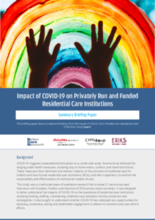COVID-19 triggered unprecedented disruption on a world-wide scale. Governments enforced far-ranging public health measures, including stay at home orders, curfews and travel restrictions. These measures have had direct and indirect impacts on the provision of residential care for children and have forced residential care institutions (RCIs) to confront the sustainability and effectiveness of institutional models of care.
This study was a small-scale piece of qualitative research that involved 21 semistructured interviews with founders, funders, and directors of RCIs across 7 countries. It was designed to better understand the impacts of COVID-19 on the operations of residential care institutions including funding, staffing, volunteering, children’s care, education, family connection and reintegration. It also sought to understand whether COVID-19 has catalysed new opportunities for advocacy, awareness raising and stakeholder engagement in relation to transition and care reform efforts.
This briefing paper draws on data and findings from the report: Impact of COVID-19 on Privately Run Residential Care Institutions: Insights and Implications for Advocacy and Awareness Raising.
Also read:
- Impact of COVID-19 on Privately Run and Funded Residential Care Institutions: Briefing Note for Volunteers and Volunteer Sending Organisations
- Impact of COVID-19 on Privately Run and Funded Residential Care Institutions: Briefing Note for Donors and Supporters of Overseas RCIs
- Impact of COVID-19 on Privately Run and Funded Residential Care Institutions: Briefing Paper for In-Country Organisations Engaging with RCIs

